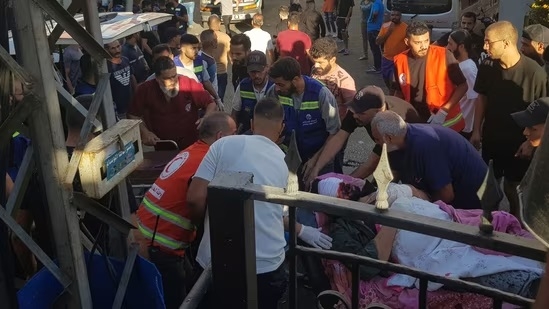Pager attacks Toll rises to 12, over 3,000 hurt
19 Sep 2024 10:08:56

TAIPEI :
Taiwan firm denies manufacturing pagers used in the blasts
TOLL from pager explosions used by the militant group Hezbollah in Lebanon and Syria climbed to 12, including two children, and wounding nearly 3,000. Hezbollah and the Lebanese Government blamed Israel for what appeared to be a sophisticated remote attack.
A Taiwanese company on Wednesday denied manufacturing the pagers involved in detonations across Lebanon. Taiwan's Gold Apollo Co. said that the pagers used in detonations in Lebanon were not made by it, but by a Hungarian company which has a license to use
its brand.
“The product was not ours. It was only that it had our brand on it,”
Gold Apollo founder and President Hsu Ching-Kuang was quoted as saying by the Taipei Times as he addressed the media at the company's offices in New Taipei City on Wednesday.
Citing images of the destroyed pagers, which included stickers and designs quite similar to those produced by Gold Apollo, some reports had asserted that Hezbollah had ordered 5,000 pagers from the Taiwan-based company.
However, Gold Apollo issued a statement refuting these claims, clarifying that the pagers in question were manufactured by Hungarian company BAC under a brand trademark agreement.
The attack in Lebanon started Tuesday afternoon, when pagers in their owners’ hands or pockets started heating up and then exploding — leaving blood-splattered scenes and panicking bystanders. It appeared that most of those hit were members or linked to members of Hezbollah — whether fighters or civilians — but it was not immediately clear if people with no ties to Hezbollah were also hit. Hezbollah said in a statement on Wednesday morning that it would continue its normal strikes against Israel as part of what it describes as a support front for its ally, Hamas, and Palestinians in Gaza.
“This path is continuous and separate from the difficult reckoning that the criminal enemy must await for its massacre on Tuesday,” it said. “This is another reckoning that will come, God willing.”
At hospitals in Beirut on Wednesday, the chaos of the night before had largely subsided, but relatives of the wounded continued to wait.
Lebanon Health Minister Firas Abiad told journalists during a tour on hospitals on Wednesday morning that many of the wounded had severe injuries to the eyes, and others had limbs amputated.
Journalists were not allowed to enter hospital rooms or film patients.
Abiad said that the wounded had been sent to various area hospitals to avoid any single facility being overloaded and added that Turkey, Iraq, Iran, Syria and Egypt offered to help treat the patients.
Earlier Wednesday, an Iraqi military plane landed in Beirut carrying 15 tonnes of medicine and medical equipment, he said.
Experts believe explosive material was put into the pagers prior to their delivery.
The AR-924 pager, advertised as being “rugged,” contains a rechargeable lithium battery, according to specifications advertised on Gold Apollo’s website before they were removed after the attack.
It claimed to have up to 85 days of battery life. That would be crucial in Lebanon, where electricity outages have been common after years of economic collapse. Pagers also run on a different wireless network than mobile phones, making them more resilient in emergencies — one of the reasons why many hospitals worldwide still rely on them.
For Hezbollah, the pagers also provided a means to sidestep what’s believed to be intensive Israeli electronic surveillance on mobile phone networks in Lebanon.
“The phone that we have in our hands — I do not have a phone in my hand — is a listening device,” warned Hezbollah chief Hassan Nasrallah in a February speech.
Taiwan’s Ministry of Economic Affairs said from the beginning of 2022 until August 2024, Gold Apollo has exported 260,000 sets of pagers, including more than 40,000 sets between January and August of this year. The ministry said that it had no records of direct exports of Gold Apollo pagers to Lebanon.
An American official said Israel briefed the United States on Tuesday after the attack, in which small amounts of explosive hidden in the pagers were detonated. The person spoke on the condition of anonymity because they were not authorised to discuss the information publicly.
Hezbollah and Israeli forces have exchanged fire nearly daily since October 8, the day after a deadly Hamas-led attack in southern Israel triggered a massive Israeli counteroffensive and the ongoing war in Gaza. Since then, hundreds have been killed in the strikes in Lebanon and dozens in Israel, while tens of thousands on each side of the border have been displaced.
Tuesday’s attack — and the fact that Hezbollah blamed Israel — renewed fears that the two foes could lead to all-out war. Despite periodic cycles of escalation, the two have carefully avoided that so far, but Israeli leaders have issued a series of warnings in recent weeks that they might escalate operations against Hezbollah in Lebanon.
9 killed, 300 hurt in fresh blasts
BEIRUT :
WALKIE-talkies and solar equipment exploded in Beirut and multiple parts of Lebanon on Wednesday in an apparent second wave of attacks targeting electronic devices a day after hundreds of pagers used by Hezbollah blew up, state media and Hezbollah officials said. At least nine people were killed and more than 300 people wounded in the second wave, the Health Ministry said.
The attacks, which were widely believed to be carried out by Israel targeting Hezbollah, have hiked fears that the two sides’ simmering conflict could escalate into all-out war. Speaking to Israeli troops on Wednesday, Israeli Defence Minister Yoav Gallant said, “We are at the start of a new phase in the war — it requires courage, determination and perseverance.” He made no mention of the explosions of electronic devices but praised the work of Israel’s army and security agencies, saying “the results are very impressive.”